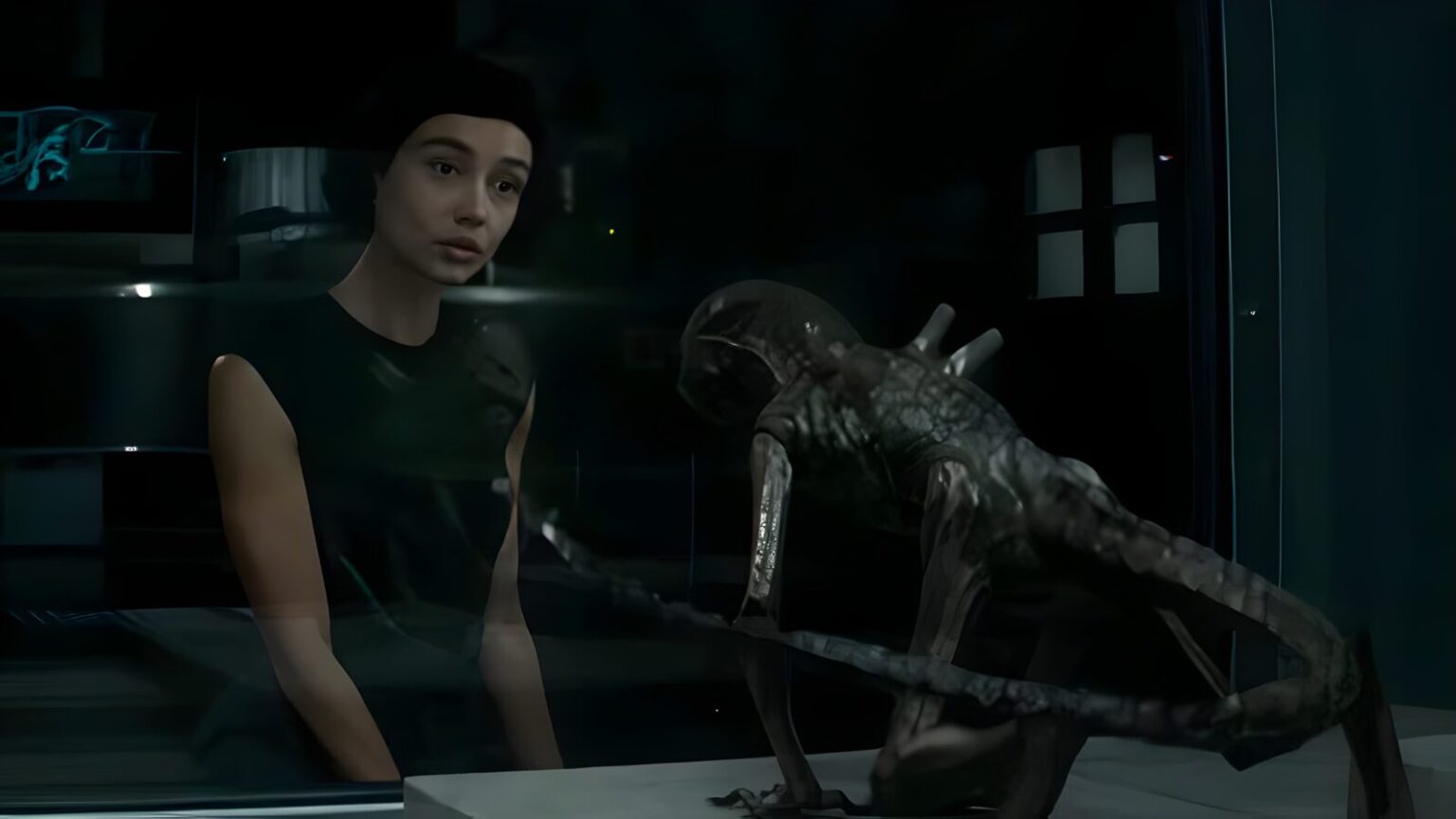TL;DR: The specimens escape, two major characters die, Wendy’s empathy becomes dangerous, and Alien: Earth officially kicks into full nightmare mode.
Alien: Earth
There’s a rhythm to Alien storytelling that you start to recognize after you’ve seen enough of them. First comes the awe—maybe even a strange kind of beauty—in the face of impossible biology. Then comes the corporate greed, the whispered betrayals, the scientists who think they can poke the monster with a stick and not get eaten. Finally, the silence is broken by the wet sound of chitin and bone tearing through flesh. Every Alien story eventually reminds us that survival is a losing game. The best you can hope for is temporary reprieve.
Noah Hawley, being Noah Hawley, isn’t just replicating that arc in Alien: Earth. He’s mutating it. He’s threading in Peter Pan parallels, transhumanist angst, and questions about whether humans are even worth saving in the first place. And in Episode 6, aptly titled “The Fly,” we hit that pivot point in every Alien tale: the cages can’t hold forever. The specimens escape, not everyone makes it out alive, and the lines between experiment, captor, and captive blur in ways that feel both tragic and inevitable.
This episode is messy in all the ways I wanted it to be messy—characters making terrible choices because of fear, love, or coercion; creatures evolving faster than anyone predicted; and a slow churn of dread that explodes into bursts of chaos. It also solidifies Wendy as one of the most fascinating protagonists in this franchise’s long, acid-blood-soaked history.
I want to walk you through it all, but not like a dry recap. I want to linger in the quiet parts, the strange parts, the deeply human moments that make the monster attacks hurt more when they finally arrive. Because this episode? It’s not just about xenomorphs. It’s about memory, loyalty, and the cruel fact that survival often demands a kind of brutality we don’t want to admit we’re capable of.
Wendy and the Problem of Empathy in a World That Punishes It
Let’s start with Wendy. I’ve said before that she’s one of the best additions Hawley has made to this universe. Sydney Chandler plays her with this unnerving mix of innocence and quiet menace, like someone who could rip your head off or give you a hug and genuinely doesn’t know which would be more appropriate. Episode 6 leans hard into that duality.
We open with her chatting with a nearly grown xenomorph through the glass of its enclosure, like a kid whispering secrets to a dangerous pet. The Lost Boys look on, half horrified, half fascinated. Joe watches too, and he’s clearly carrying the burden of being the only one consistently asking: is this safe? Is this sane?
What’s fascinating is that Wendy doesn’t just feel sympathy for the aliens—she identifies with them. She sees herself reflected in their captivity, in their treatment as specimens. When she tells Joe that maybe the xenomorph “could be good,” it’s not naïveté. It’s projection. She’s talking about herself, about her own hope that someone can look at her hybrid existence and see more than a monster.
And yet, Hawley doesn’t let us get too comfortable with that hope. Because in the Alien universe, empathy is a liability. It’s how you get facehugged. It’s how you let your guard down and become a meal. Wendy might think she’s found kinship, but we’ve seen enough chests burst to know that ends in blood.
Watching her resist Joe’s plan to get her off the island—essentially choosing captivity over uncertain freedom—was heartbreaking. It reminded me of people in toxic relationships who cling to what’s familiar because the alternative is scarier. Wendy wants to believe Boy Kavalier’s world offers possibilities. We, the audience, know better.
Memory Wipes and the Violence of “Mercy”
Then there’s Nibs, who goes through one of the most quietly horrifying arcs this episode. Atom Eins decides she’s too unstable, too traumatized, so he orders her memory wiped. Not just a clean slate—her entire personality is scrubbed down and rebuilt to be calmer, more compliant.
When she comes back online, she’s smiling, confused, stripped of all the pain that made her human (or as human as a hybrid can be). Wendy sees through it immediately. Her horror at Nibs’ blank innocence is gut-wrenching, because Wendy recognizes it for what it is: a violation dressed up as mercy.
This subplot is one of the smartest ways the show interrogates what it means to be human. We like to think of trauma as something to overcome, but trauma is also memory, and memory is identity. Nibs’ wiped mind isn’t “better”—it’s a new prison. And Wendy, already grappling with her own blurred sense of self, sees her friend reduced to a docile shell. That moment might be more disturbing than the actual creature kills in the episode.
The Corporate Sharks Circle
Parallel to the hybrid drama, we get another boardroom-style clash between Boy Kavalier and Yutani. These scenes are some of my favorites in the show because they remind us that in the Alien universe, the monsters are never just the monsters. The real horror is always the people in suits who treat life as a bargaining chip.
Boy Kavalier is pure arrogance here—bare feet on the table, smirking as he names his price. Yutani tries to play it straight, but her underling Morrow is the real shark. His plan to destabilize the facility while snatching a specimen isn’t just reckless—it’s inevitable. Because in this world, corporate rivalry isn’t about profit margins. It’s about who can weaponize the monsters first.
And that’s what makes this episode tick: every character is trapped in someone else’s agenda. Wendy in Boy Kavalier’s dream of hybrid transcendence. Nibs in Atom Eins’ vision of obedient soldiers. Arthur caught between loyalty to the Lost Boys and the impossible calculus of survival. Even Joe, who wants to escape, can only do so by playing along until the right moment.
Isaac’s Death and the Fragility of Innocence
If you want to talk about the most gut-punching scene in the episode, though, it has to be Isaac in the lab.
Kit Young plays Isaac with such guileless curiosity that watching him make one bad choice after another is unbearable. He enters the enclosure because a hatch is stuck—because he wants to help, because he doesn’t understand the risk. And then he’s trapped.
The flying aliens, which are still new and horrifying in design, descend on him. The acid spit burns through his face, his body, his very identity as an artificial child. And then, in one of the show’s cruelest ironies, the creatures drink from his dissolving form like he was nothing more than a juice box.
It’s not just a death. It’s a desecration. And it underlines something that’s been true since the first chestburster: in this universe, innocence is never a shield. If anything, it makes you more vulnerable.
Slightly’s Betrayal and Arthur’s Doom
And then comes the real betrayal. Slightly, coerced by Morrow’s threats against his family, locks Arthur in with the facehugger.
This scene is agonizing because you can feel everyone’s desperation colliding. Arthur, who was finally trying to help Joe and Wendy escape, gets repaid with a facehugger to the mouth. Slightly, trembling with guilt, insists he had no choice. And in the background, Kirsh watches it all like a detached god, confirming what we’ve suspected: no one is really in control here.
Arthur’s fate is sealed in seconds. And because this is Alien, we know what comes next. Whatever bursts out of him will not just kill him—it’ll ripple through the group, escalate the chaos, and push everyone closer to annihilation.
The Eye That Watches
The final shot of the episode—Ocellus’ alien eye staring directly into the camera as Godsmack’s “Keep Away” blares—is one of those rare moments where Hawley drops all subtlety and just revels in pulp horror. And honestly? I loved it. After nearly an hour of tension, betrayal, and existential dread, ending on a monster staring us down with nu-metal rage feels earned. It’s a reminder: this is still Alien. Things are about to get loud, bloody, and very, very bad.
Verdict
Alien: Earth Episode 6 is brutal, messy, and absolutely necessary. It’s the episode where the show stops playing nice and reminds us that containment never lasts. Some of the best characters are gone. Others are broken in ways that can’t be undone. And the monsters are just getting started.







